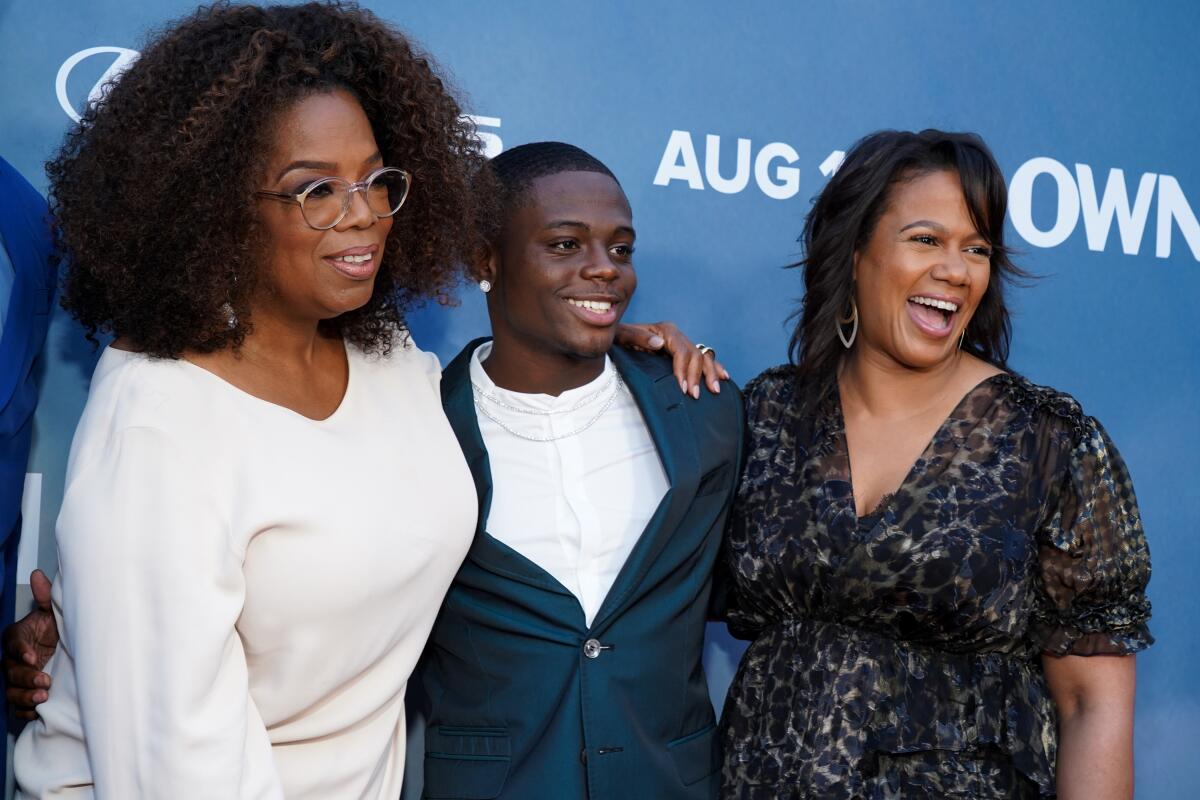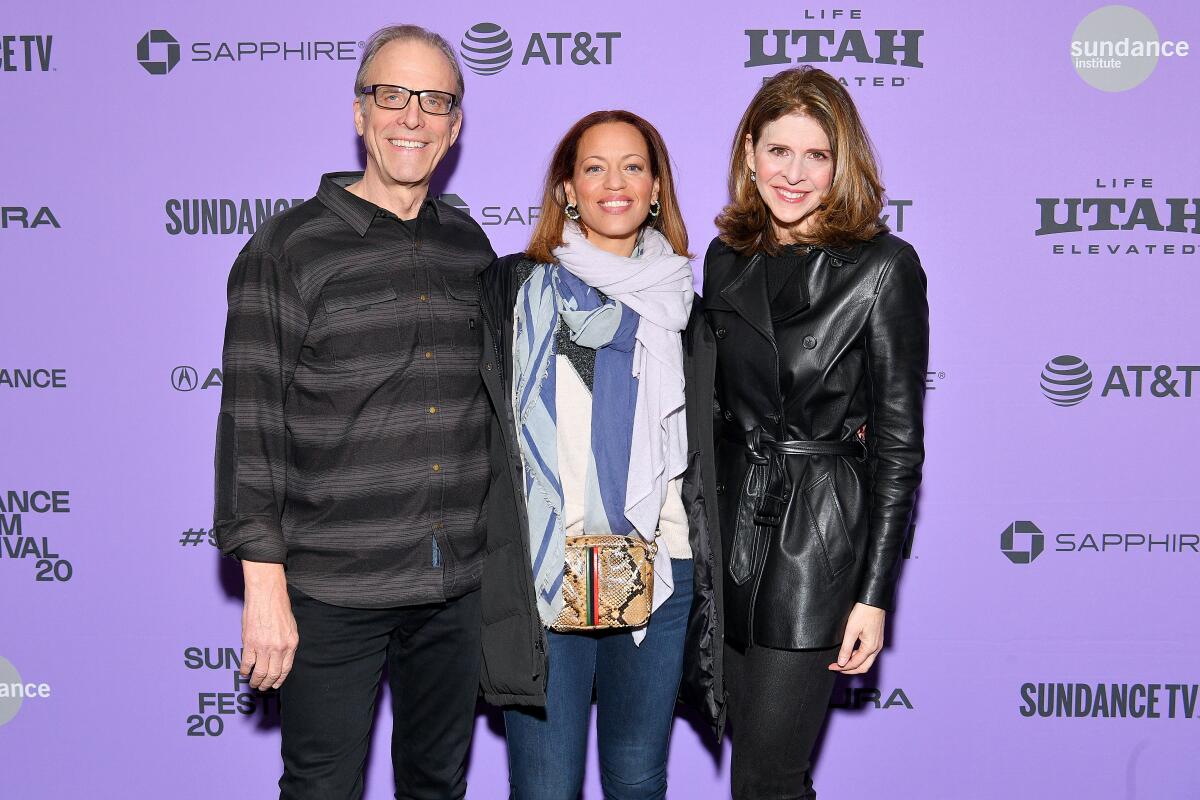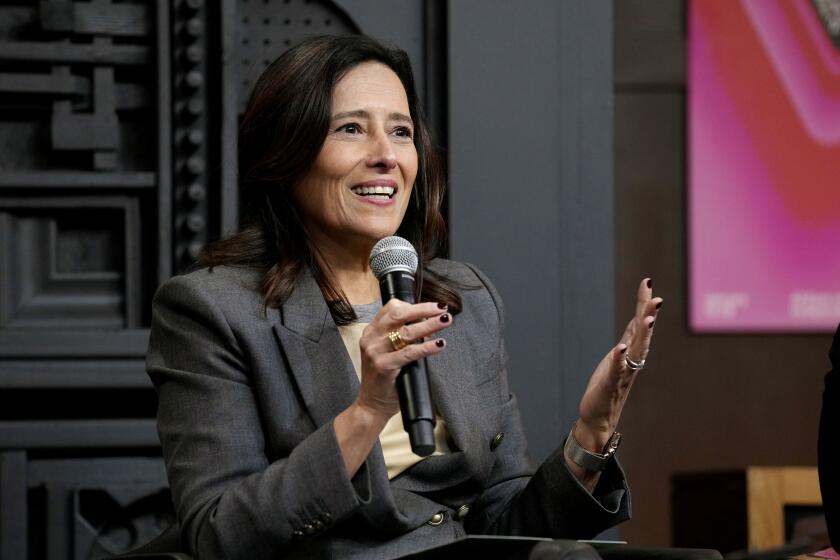Why did Oprah Winfrey drop her Russell Simmons documentary?

PARK CITY, Utah — When Oprah Winfrey abruptly pulled her support from a documentary detailing sexual abuse allegations against Russell Simmons, she insisted that the decision had nothing to do with pressure from the embattled hip-hop mogul himself.
Although Winfrey has admitted that Simmons repeatedly urged her not to trust the female subject at the center of the film, Drew Dixon, she said she ultimately withdrew her executive producer title from the project — thereby scuttling the film’s distribution deal with Apple TV+ — after discussions with other individuals. A Jan. 17 interview with the New York Times stated that Winfrey “still believed” Dixon but “thought there were inconsistencies in her account.” In addition, Winfrey said that the director Ava DuVernay found the movie — titled “On the Record” — problematic, as did “someone she knew and trusted who cast doubts on Ms. Dixon’s story.”
For the record:
11:35 a.m. Jan. 31, 2020An earlier version of this post stated that Oprah Winfrey’s inner circle was concerned about “inconsistencies” in the portrayal of several of the accusers’ stories. It has been updated to clarify the nature of those concerns, which included that strong and emotionally wrenching elements had been left out of the film.
Now Dixon believes she knows who that person was: Tina Perry, the president of the Oprah Winfrey Network, who was also one of Dixon’s sorority sisters when the two attended Stanford University.
Hours after “On the Record” premiered to standing ovations at the Sundance Film Festival over the weekend, Dixon said she felt she could finally breathe a sigh of relief after a month in which her character has been publicly questioned. Dixon went public with her story in December 2017, when she told the New York Times that Simmons raped her when she was a 24-year-old executive at Def Jam Recordings in 1995. She is now one of 20 women who have claimed that Simmons was sexually inappropriate with them, allegations detailed in the new documentary, directed by Amy Ziering and Kirby Dick. (Simmons has vigorously denied that he has ever had non-consensual sexual relations.)
On Dec. 3, Apple TV+ and Winfrey’s Harpo Productions — which has a deal with the streaming company — issued a press release announcing plans to distribute “On the Record” following its Sundance debut. Shortly after the announcement, the filmmakers told Dixon they’d heard from Oprah’s team that a “trusted friend who has known Drew through Def Jam and Arista” had told Winfrey that Dixon was not a reliable source.
“Amy and Kirby kept asking me, do you know anybody who fits that description?” Dixon said. “I said, ‘That’s a teeny-tiny universe of people. I don’t think so.’ Then, all of a sudden, I was like: ‘Oh, snap. My sorority sister, Tina Perry.’”
In a statement, Perry acknowledged that she and Dixon “were friends and sorority sisters, but we haven’t spoken in decades.”
Perry continued, “I was sad to learn about her horrible experience with Russell Simmons at his apartment.” The OWN executive added, “I commend Drew for her strength and courage to come forward and tell her story.”
A source close to the situation confirmed that Perry advised pulling the film out of Sundance, but stressed that the executive was one of a number of people in Winfrey’s inner circle — including DuVernay and Terry Wood, executive vice president of Harpo Productions — who shared that opinion.
The group was worried about the perceived “inconsistencies” in Dixon’s story, this person said, while declining to go on the record with any specific concerns; they also felt that strong and emotionally wrenching elements of the other accusers’ stories had been left out of the film. Their unease grew as multiple people from the outside called Winfrey to offer conflicting accounts. And the source emphasized that Winfrey’s team was pushing to delay the film’s release, not to block it; the aim was to give the filmmakers time to strengthen the documentary.
The filmmakers pushed back, arguing that delaying the planned Sundance premiere date might traumatize the accusers, whose stories could come into question if the documentary was perceived as troubled. They also pointed out that projects that debut at Sundance are commonly updated before a wider release.
“There wasn’t one deciding factor” in Winfrey’s decision to withdraw from the project, the source close to the situation said. “It was just that there were holes in the story.” Winfrey has emphasized that she still believes the accusers despite having withdrawn from the project.
Perry was two years behind Dixon at Stanford, but the two kept in touch after graduation, Dixon said. Around 1999, when Perry began working in New York City at the law firm Cravath, Swaine & Moore, the two reconnected, Dixon said. Dixon had moved on from Def Jam and was serving as vice president of A&R at Arista Records. She said that Perry was interested in pursuing entertainment law, so Dixon began inviting her to observe recording sessions with artists like Lauryn Hill and Q-Tip.
“I’m bringing her along and trying to say: ‘Be a fly on the wall. This is how I learned. Just see how the moves are and make some connections if you want to be an entertainment lawyer.’ She was kind of like a baby sister to me, right?” Dixon explained.
But slowly, Dixon said, private details from those professional visits began to spread around town.
“It would get back to me through the grapevine,” Dixon said. “So I’m like, ‘Tina, honey, I get this is exciting. I get you want to be in the entertainment industry. But when I let you spend time in my office or I chat with you about my work, I’m trying to help you learn the industry. That can’t come back to me. ... I literally can’t bring you around these people if you are treating it as gossip.’”
Eventually, Dixon said, the behavior caused Dixon to sever the friendship, and she and Perry lost touch.
“And then, all of a sudden, I’m hearing in December that Oprah has a trusted friend” raising doubts about Dixon.

Winfrey declined to comment for this story, but in a Jan. 21 interview with “CBS This Morning” said: “I believe the women’s voices deserve to be heard” and “I do hope people will see the documentary.”
Winfrey has been open about the fact that she herself survived sexual violence, saying in that television interview that she has “lived MeToo since” she was 9 years old. She has been a vocal supporter of other alleged survivors, last year hosting an HBO special with two men who said in the docuseries “Leaving Neverland” that they were molested by Michael Jackson when they were boys. In 2010, after a matron at Winfrey’s South African girls school was found not guilty of improperly touching teenage students, she said she was “profoundly disappointed at the outcome of the trial.”
Dixon said she has never interacted with Winfrey and has not reached out to Perry since December because she didn’t want to “take the bait.” There is still much that is unclear to the film’s subjects about Winfrey’s decision to step away from the project, and Dixon reiterated that she wasn’t even sure Perry “said half of this stuff. I don’t even know where the story begins and ends.”
Nevertheless, when questions about her veracity were raised last month, Dixon said, she began to grow frustrated. She did not understand why the filmmakers were pushing the bruise again.
“Why are they making me walk through this again in such lurid detail? They’re calling my corroborating sources again, who then start calling me asking, ‘Why am I getting calls again from the filmmakers? I answered these questions a year ago,’” Dixon said. Multiple calls to corroborating sources can be part of any reporting process, but Dixon found the repeat calls unnerving. “In the eleventh-and-a-half hour, the fundamental facts — not only of the allegations — but my character is now just being thrown out there. It’s shocking.”
In “On the Record,” Dixon, now 49, says that the way she was treated by men in the music industry ultimately led her to exit the business altogether. After departing Arista, she enrolled in Harvard Business School and has been in the process of raising money to launch a mobile hair company, EverythingDid. Following the publication of her story in the New York Times, she also heard from a young musician, Ella Wylde, who sought Dixon’s help in launching a music career. She plans to record Wylde’s album soon.
“I guess I hope to make up for lost time,” Dixon said. “I have so much pent-up professional and creative energy and can’t wait to use so many of the skills that I haven’t been able to utilize while sidelined by toxic men and their spheres of influence.”
Since “On the Record” will no longer be distributed via Apple TV+, the film is seeking a new release partner. And if the world is eventually able to see the film, Dixon said, she’ll no longer feel like she’s left “dangling from a cliff.”
“I think the film is its best defense,” she said. “I think the film just deserves a shot. That’s what I hope for, and I have hope after the premiere that film will get a shot.”
Times staff writer Meg James contributed to this report.
More to Read
Only good movies
Get the Indie Focus newsletter, Mark Olsen's weekly guide to the world of cinema.
You may occasionally receive promotional content from the Los Angeles Times.











